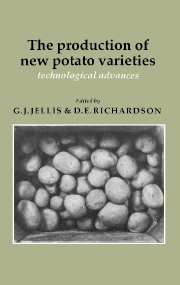Book contents
- Frontmatter
- Contents
- List of contributors
- Preface
- Editors' note and acknowledgements
- Introduction
- The development of potato varieties in Europe
- Genetic Resources
- Breeding Strategies
- Selection and Screening Methods
- The efficiency of early generation selection
- Problems associated with early generation selection of potato clones in West Siberia
- Influence of weight of seed tubers on selection of first year clones: preliminary results
- A joint cyst nematode/late blight test for early generation screening of potato clones
- Screening for resistance to diseases in a potato breeding programme
- Breeding for resistance to potato viruses with special reference to cDNA probes
- Screening for resistance to diseases and pests
- Breeding for resistance to and tolerance of potato cyst nematode
- Breeding multi-resistant potato germplasm
- Resistance to storage diseases in breeding stocks
- Phytophthora research at the Foundation for Agricultural Plant Breeding (SVP)/ The Netherlands
- Effect of time interval between inoculation and assessment on relative content of potato virus YN in leaves of potato plants
- Selection and evaluation of potatoes for improved tolerance of environmental stresses
- Variety Assessment
- Semi-conventional Breeding Methods
- True Potato Seed
- Unconventional Breeding Methods
- Commentary
- Index
Phytophthora research at the Foundation for Agricultural Plant Breeding (SVP)/ The Netherlands
Published online by Cambridge University Press: 05 March 2012
- Frontmatter
- Contents
- List of contributors
- Preface
- Editors' note and acknowledgements
- Introduction
- The development of potato varieties in Europe
- Genetic Resources
- Breeding Strategies
- Selection and Screening Methods
- The efficiency of early generation selection
- Problems associated with early generation selection of potato clones in West Siberia
- Influence of weight of seed tubers on selection of first year clones: preliminary results
- A joint cyst nematode/late blight test for early generation screening of potato clones
- Screening for resistance to diseases in a potato breeding programme
- Breeding for resistance to potato viruses with special reference to cDNA probes
- Screening for resistance to diseases and pests
- Breeding for resistance to and tolerance of potato cyst nematode
- Breeding multi-resistant potato germplasm
- Resistance to storage diseases in breeding stocks
- Phytophthora research at the Foundation for Agricultural Plant Breeding (SVP)/ The Netherlands
- Effect of time interval between inoculation and assessment on relative content of potato virus YN in leaves of potato plants
- Selection and evaluation of potatoes for improved tolerance of environmental stresses
- Variety Assessment
- Semi-conventional Breeding Methods
- True Potato Seed
- Unconventional Breeding Methods
- Commentary
- Index
Summary
Research at the SVP on resistance to Phytophthora infestans focuses on:
1) the development of efficient methods to evaluate the level of race nonspecific haulm resistance to P. infestans and to distinguish between different components of resistance;
2) the detection of genotypes with race nonspecific resistance to P. infestans;
3) the study of resistance mechanisms and the inheritance of the resistance; In this paper these research topics are highlighted and future research plans are mentioned.
DEVELOPMENT OF TEST METHODS
A field test has been developed at the SVP to assess leaf resistance to P. infestans. Clones to be tested are planted between spreader rows of a susceptible variety, in replicated microplots of six plants each. Standard varieties are included for comparison. All plants are inoculated artificially with a zoospore suspension. The percentage of diseased leaf area is assessed seven times per clone at weekly intervals, starting one week after inoculation. These seven scores are transformed to a weighted mean (WM) value using a formula (Tazelaar 1981). The WM values of 30 varieties lacking major (R) genes corresponded well with the known scores for resistance to P. infestans in the Dutch variety list (r = -0.85). Moreover the results of this test appeared to be highly reproducible.
However, correlation analyses showed that there are high positive coefficients of correlation between:
- Type
- Chapter
- Information
- The Production of New Potato VarietiesTechnological Advances, pp. 99 - 101Publisher: Cambridge University PressPrint publication year: 1987



